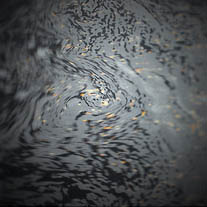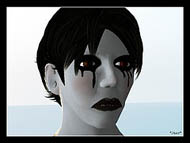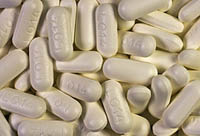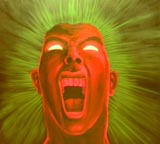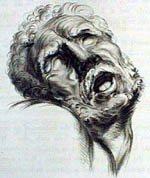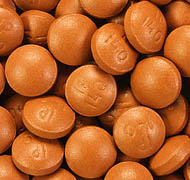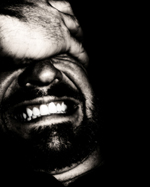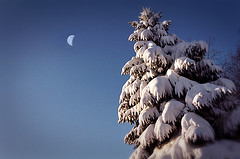 He awoke, as usual, way too early, around 7 AM. Being a night person, that meant he only got 4-5 hours of sleep, not quite enough. But it happened often to him. And since optimism wasn’t one of his surpluses, a heaviness filled him seeing dawn’s early light.
He awoke, as usual, way too early, around 7 AM. Being a night person, that meant he only got 4-5 hours of sleep, not quite enough. But it happened often to him. And since optimism wasn’t one of his surpluses, a heaviness filled him seeing dawn’s early light.
He felt the warm little body of Punky, his oldest cat, next to him. The thermostat was set to go down to 55 at night to save energy, so Punky, now almost 18, always slept as close as possible to his body to keep warm.
Instead he found Perlin, his younger Siamese, in Punky’s place. He petted Perlin, and asked him what he had done with Punky, whose spot he had taken. Perlin just looked at him with that look cats give which can mean anything. “Punky, who?” or “I was just asleep, why are you asking me?” Rather than roll over to fall asleep until a more civilized hour, he got up to see where Punky was.
The furnace had kicked on to heat the house up, as it was set to do about this hour. But the air was still burning cold to his near naked skin. He had almost no fat on his body, so the cold went right through to his bones as he descended the stairs in boxer shorts.
He found Punky sitting on one of the spindly café chairs by the back window, like a little monk folded up in a peaceful meditation pose. At first he seemed lonely to Dorn. After all, if he were human, old as an oak sitting alone in a cold room, he would seem lonely. But then he realized Punky wasn’t too bad off. The chair he was sitting on was right over a large heating vent, which was now blasting nice, cozy warm air, and would be for at least the next half hour.
He approached Punky and tried to pet him, but he pulled away. He rose out of his meditative pose and turned to face the picture window behind him. Dorn’s eyes followed.
The morning was a brittle white icing on a cake which had sat out for a day too long. The fresh snow from the day before had hardened under a bitter blanket of night cold. Tracks and various marks held account of the previous day’s activities. He could see where he had stepped to sweep the back steps and where he walked through the garden to shake the piles of snow off the evergreen branches to keep them from collapsing under the its weight. His car had made two crystalline geometric tracks into the now closed garage.
In the sky, a sharp slice of thin moon pierced the aching dawn. He was reminded of the movie he had seen the night before on network TV, The Day After Tomorrow, about how global warming could create terrible mega-storms which might, in one scenario, bring down the crushing cold of space to earth’s fragile surface, freezing everything on it. But this sky had the promise of life-giving warmth just beyond its horizon, a glow to which the moon pointed, and which Punky faced through the window.
Through the double pane glass he heard a bird chirp, one piercing peep. It was still gray enough to hide clear sight of the scene outside. Most birds were still asleep, he figured. He found the bird, a female cardinal, her brownish red blending with the twisted sticks of the wisteria clamoring over the garage.
Then he noticed that the bird feeder, a covered rectangular platform like a little house atop a six foot pole, was empty. Though he filled it daily they ate it as fast as he could fill it. He knew a swarm of birds would soon be fluttering around looking for breakfast on that feeder. They relied on it, especially when snow covered the ground.
The cardinal swooped to the feeder and pecked at it. It was only ten feet from the back window. Half naked and singed with cold, Dorn stood there and watched. It looked so cold out. But he knew he had to fill that feeder. He couldn’t go back to bed with the lingering thought of those cold birds.
He went upstairs to cover his bony body with a terrycloth robe and bedroom slippers. Punky continued staring out the back window as Dorn opened the back door. As he broke beyond the wall of heat coming from the vent by the door, his skin recoiled against the heat sucking molecules of dense lifeless air. If he had fur, it would stand on end to conserve warmth. Instead, the benign terrycloth did little to help. Luckily the garage, where the birdseed was stored, wasn’t more that twenty feet away.
After dumping a bowl full of seed on the feeder, he scurried back indoors. Punky ignored his shivering entrance and continued to peer out the window. Within minutes the show began as the light rose from within the dead cold snow. Dozens of birds appeared from the dormant scenery around the garden. The feeder became grand central station, with flights arriving and departing in a continuous stream from the hub to all the bushes and trees around the garden.
A lone squirrel, covered in snow like a little kid out in it for the first time, dug for scrap seed in the frozen icing as patiently as a scholar seeking a cure for cancer. All this activity filled Dorn’s mind against the leering void of the the approaching day. Sharp rays of sun now splintered the aching cold morning into pieces he could grasp and hold onto.
Punky turned around to gaze at him with a kitty kiss, eyes slowly closing and opening.

